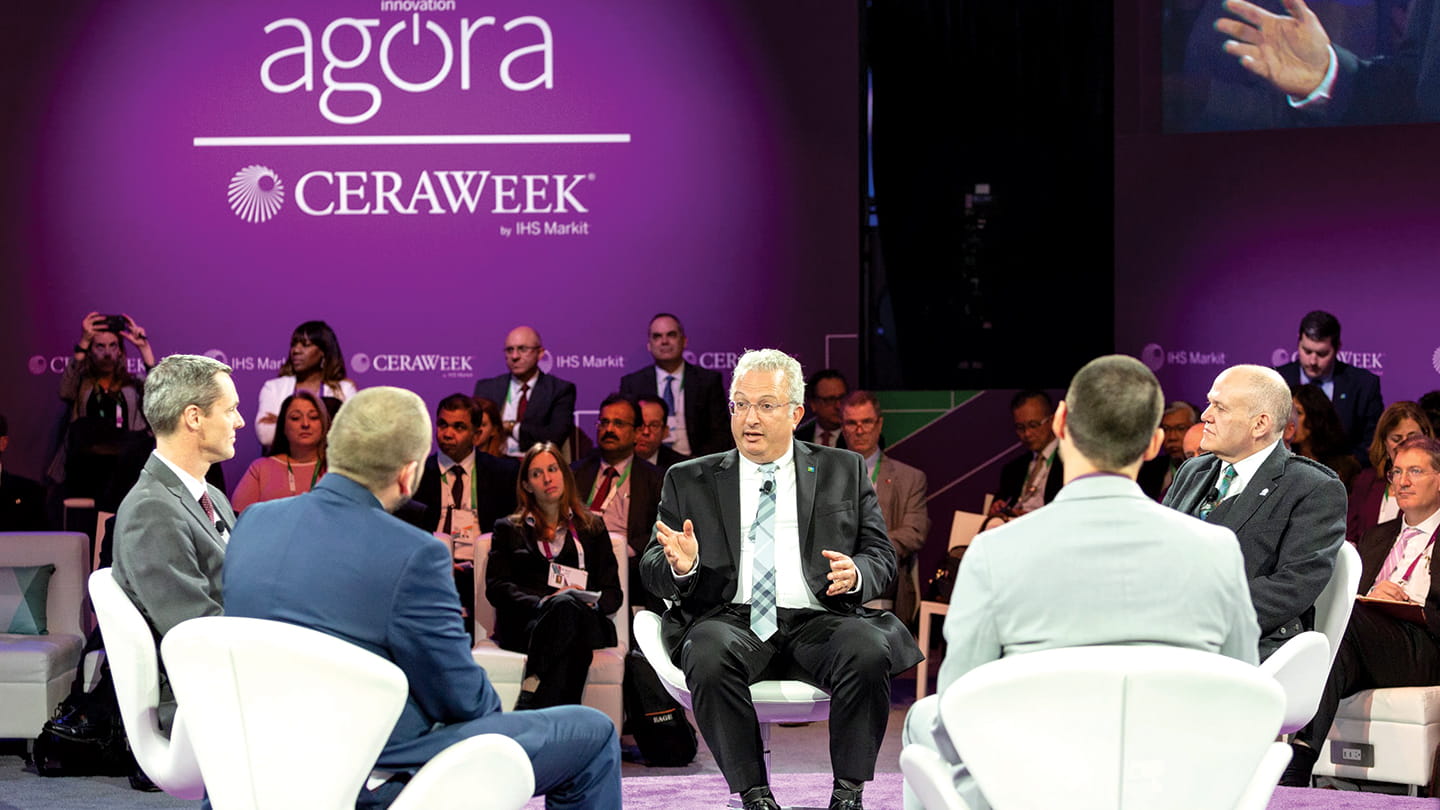Saudi Aramco shows innovation and technology leadership at Houston energy summit

Bashir M. Dabbousi speaks at a CERAWeek 2019 roundtable discussion on the future of hydrogen and transportation. Dabbousi said Saudi Aramco is partnering to build the Kingdom’s first hydrogen fueling station for cars this year, adding that hydrogen may have better prospects than batteries for a range of low-carbon transport applications.
Saudi Aramco’s leading role in energy innovation was on full display at CERAWeek 2019 in Houston as the company’s technology strategists and researchers discussed their latest solutions and spoke about the path forward for new technologies to drive sustainability in the industry.
Saudi Aramco chief technology officer Ahmad O. Al-Khowaiter spoke on a panel called “Digital Transformation: Creating Value,” and another titled “The Quiet ICE (Internal Combustion Engine) Revolution. New Tech Driving New Directions.”
Al-Khowaiter told the audience that software advancements using artificial intelligence, big data, and predictive analytics have shown great promise in certain cases. To scale these applications across enterprises, companies must further develop the digital skills of workers and change work flows so that front-line personnel are constantly encouraged to test new tools in their jobs, he said.
“Freeing up data to flow across silos and to fully leverage it will allow the Fourth Industrial Revolution (IR 4.0) to flourish,” said Al-Khowaiter.
Al-Khowaiter also spoke about the need for governments to ensure a sound policy environment that adequately addresses climate challenges. Looking at carbon emissions through a more holistic “wells-to-wheels” lens can help create better policy outcomes — especially when it comes to evaluating various transport technologies, he said.
Given the consensus among all major forecasts that ICEs will make up the overwhelming majority of the world’s light-duty vehicle fleet for decades to come, the development of cleaner burning engines would reduce emissions faster and more economically than trying to switch fleets around the world to electric vehicles, he said.
Saudi Aramco’s research centers are developing new engines that boost fuel economy 30% or more, and reduce particulate emissions to nearly zero.
“We see ourselves as being a catalyst that brings together energy companies and automakers so that important advancements can be made by conducting innovative research on new fuels and new engines simultaneously,” said Al-Khowaiter.
Clean tech and hydrogen
Bashir M. Dabbousi, director of Technology Strategy and Planning with Saudi Aramco, spoke on a panel called “The New Energy Transition: Opportunities in Clean Tech?”
Dabbousi discussed how the company is focusing much of its resources on developing low greenhouse gas emissions technologies and converting crude oil directly to chemicals, as well as leading investments in cleaner technologies through Saudi Aramco Energy Ventures and the Oil and Gas Climate Initiative (OGCI) — which held its second venture day on industrial and transport efficiency during CERAWeek.
He also explained the company’s long history of lowering the carbon intensity of its crude production by achieving near zero flaring intensity, using best-in-class reservoir management practices and technologies, and driving for massive energy efficiency improvements across all of its operations.
Dabbousi also spoke at an engaging roundtable discussion titled “What Does the Hydrogen Transportation Economy Look Like?” Participants debated the prospect of hydrogen fuel cell electric vehicles supplanting battery electric vehicles. He also noted that hydrogen powered vehicles can offer drivers longer ranges and shorter refueling times than battery powered vehicles.
Saudi Aramco, he said, is partnering to build the Kingdom’s first hydrogen fueling station for cars this year, adding that hydrogen may have better prospects than batteries for a range of low-carbon transport applications.
“Compared to batteries, hydrogen appears much easier to scale for use in heavy-duty trucks or trains. And the good thing about hydrogen is that it is plentiful and can easily be isolated from hydrocarbons,” Dabbousi told the audience.
Media contact information
All media enquiries are handled by Aramco's Media Communications & Coordination Department, Dhahran, Saudi Arabia.
For media inquiries, please email us at media.inquiries@aramco.com

